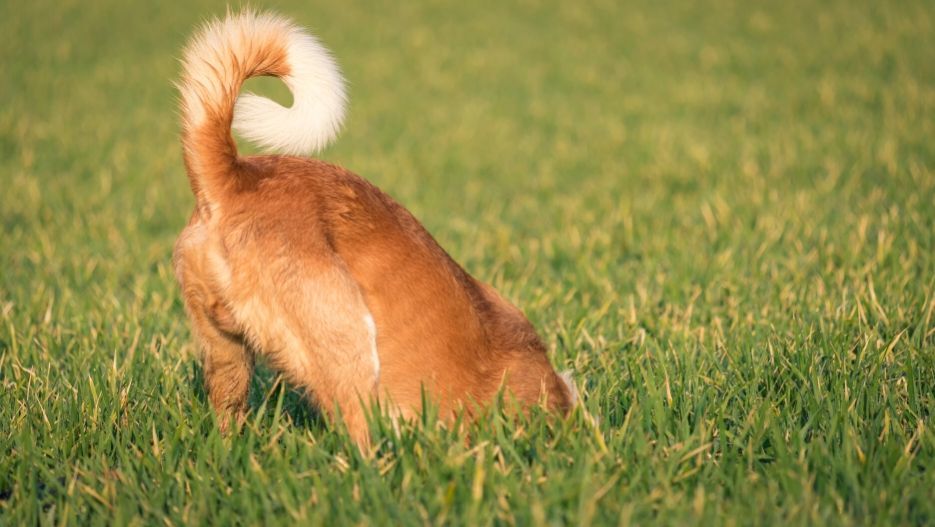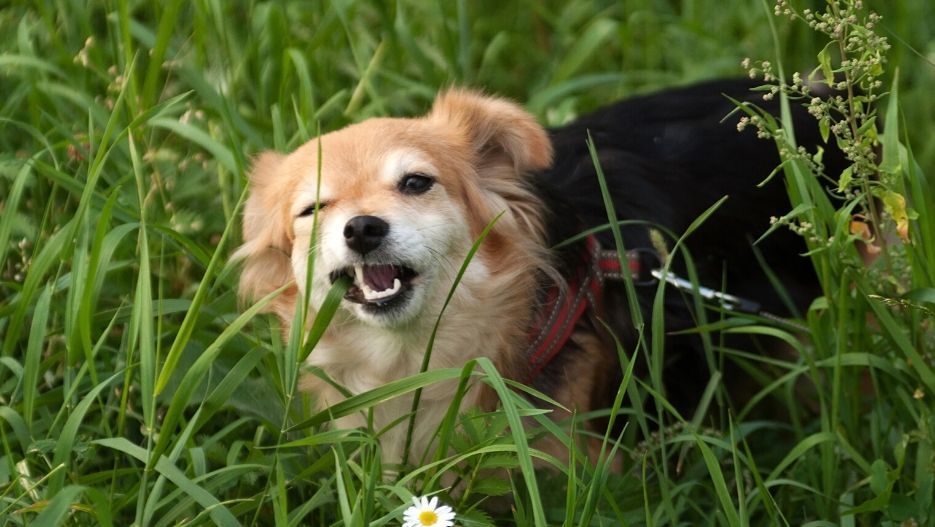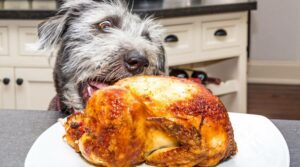Believe it or not, dirt eating is not uncommon behavior in dogs.
Every dog owner should know that at some point, their dog is going to do something strange. For some dogs it’s digging through the garbage, for others it’s the kitty litter. Other dogs enjoy eating soil.
You’re might be wondering, “Why do dogs eat dirt?” and “Is it safe?” Don’t worry, we have these answers for you!
Keep reading for answers to frequently asked questions on this topic, information on the main reasons why dogs eat dirt, and recommendations on what you should do if your dog is exhibiting this odd behavior.
Can eating dirt make my dog sick?
Regular, plain old dirt isn’t likely to make your dog sick, especially if it’s not a frequent habit. Actually, the small amounts of clay found in dirt can help ease doggie indigestion.
However, dirt CAN make your dog sick if it’s contaminated by things like fertilizer, pesticides, chemicals, metals, etc.
It’s important to know where your dog is eating dirt. If it’s in your yard and you don’t use anything harmful, a little dirt shouldn’t hurt. If you’re near a construction site or agricultural area, you may want to keep your dog from eating the soil because it could contain chemicals that aren’t safe to ingest.
Is it bad for dogs to eat dirt?

As mentioned before, eating dirt can occasionally provide dogs with some minor benefits, and unlike other things that dogs eat dirt won’t get stuck in the stomach.
Still, there are risks and concerns owners should consider before allowing this behavior to continue.
Eating dirt in large amounts could cause an intestinal blockage, while other objects in the dirt like sticks and rocks could damage your dog’s teeth or cause issues internally.
If your dog eats dirt once it’s not a huge deal but if it’s becoming a regular occurrence it’s important to act quickly and get to the root of the problem. Dirt eating is bad because it can signal health issues as well, which we explain in further detail later.
Does my dog have a mineral deficiency?
Dogs get important minerals and vitamins from their diet, which they need for different organs and systems in the body to work properly. When they don’t get the right levels of nutrition, they can get sick.
Since there are minerals in dirt, dogs sometimes eat dirt to replace something missing in their diet. Two of the most important minerals in a dog’s diet are phosphorus and calcium.
These minerals play an important role in keeping your dog’s bones and teeth healthy, along with other functions like the transmission of nerve impulses (calcium) and the provision of energy for cells (phosphorus).
Mineral deficiencies are rare in dogs being fed a complete diet, but if your dog is eating a lot of dirt, make sure that their food meets the min/max requirements for nutrients set out in AAFCO’s guidelines.
What should I do if my dog is eating dirt?
If your dog is eating dirt and it’s not just a phase it’s important to eliminate the behavior for their safety.
Next, figure out why your dog has been eating dirt and address the root cause to stop the behavior. It could be something as simple as digging through the dirt to get to something in the ground, in which case you could remove the thing they’re trying to get to.
In other cases, it could be something more complicated like a health or behavioral problem.
Either way, make sure that you don’t use negative reinforcement (like yelling or using physical force) to stop your dog from eating dirt. This doesn’t work and could actually make it harder to stop the behavior.
Instead, rely on positive reinforcement by rewarding good behavior. If you can, ‘puppy-proof’ outside your house so your dog can’t eat dirt easily. Supervise them while they are outside and if they try to eat dirt, distract them by throwing a ball to chase or by giving them a coveted leather chew toy (Amazon link).
Does my dog have pica?
It’s normal that your dog will eat some weird things over the course of its life, since dogs love to explore the world with their nose and mouth. However, if your dog is constantly eating and ingesting items that are not food, like dirt, garbage, and other household items, they may have pica.
Pica can be behavioral or caused by certain health problems (like gastrointestinal issues, liver disease, anemia, and mineral deficiencies). Pica caused by dietary deficiencies or excesses in nutrients is more common when cooking a homemade or feeding a frozen/raw diet.
There is actually a subset of pica referred to as clay eating or geophagia.
To cure pica, it’s important to find out why your dog is eating dirt (or whatever it is they are eating). If it’s because of a deficiency then adjusting their diet should stop the behavior.
If the behavior is not due to diet or a health condition, then environmental enrichment (proper exercise, love, and stimulation) can help put an end the dirt eating.
5 Reasons Why Dogs Eat Dirt

1. Exploration/Normal Puppy Behavior
A couple of paragraphs above we touched on several reasons why dogs might be eating dirt and some of them are pretty concerning. Some of those reasons are rare though, and in reality it’s pretty common for dogs to eat random things like potting soil and clumps of dirt.
In many cases there may not be a reason your dog does it, other than they like the taste and texture!
What to do about it:
This type of exploration, which is common in puppies, is okay.
It’s important that you don’t draw attention to the behavior in this stage. Don’t reward or punish them for doing it and eventually they should stop on their own.
If your puppy’s dirt eating starts to happen frequently, persists into adulthood, or is accompanied by symptoms like lethargy, lack of appetite, and/or weight loss, you should consult a vet to make sure there isn’t an underlying reason for the habit that needs to be addressed.
Also read: How to stop chewing in puppies
2. Indigestion/Gastrointestinal Problems
One of the easiest explanations for why dogs eat dirt, other than just because they like it, is that they are trying to ease indigestion or gastrointestinal problems.
Although some experts believe that this isn’t a good explanation because dogs who are trying to ease digestive upset often eat grass, clay in dirt also has health benefits and can be soothing for the stomach.
If you notice that most of the time your dog eats dirt one or two hours after eating, it could be because their food isn’t agreeing with them. This is pretty common with dry processed food diets, which contain fewer digestive enzymes. Dirt contains probiotic bacteria that helps with this.
The clay found in soil is also good for detoxification purposes. Clay has been used to help with morning sickness during pregnancy, is an ingredient in a lot of detoxifying spa treatments, and is even included in livestock feed.
If your dog eats something toxic or is feeling unwell after eating something weird, the clay in dirt will bind to food borne bacteria or viruses and push them out of your pup’s system.
What to do about it:
If you think that your dog’s dirt eating is due to indigestion and gastrointestinal problems, you need to address that problem at the source.
Make sure that their diet meets AAFCO nutritional requirements and consider adding a high quality probiotic to your dog’s diet, like the Purina Pro Plan FortiFlora Dog Probiotic Supplement (Amazon link).
Switching to a cooked or raw diet is another way to increase the digestive enzymes in your dog’s diet. These diets are natural and don’t sit in bags for months before being purchased, so it’s easier to ensure that your dog is getting quality nutrition.
Just make sure to consult a professional so you know your dog’s diet is nutritionally balanced and how to safely transition them from dry to their new diet.
Does your dog love to eat everything and anything leading to frequent indigestion? If the answer is yes, you may need to make sure that there is nothing toxic (including things like spoiled food) that they can get to in your house and outside. In this case, avoiding the trigger will reduce the need to eat dirt.
If you’re still worried your dog is being exposed to environmental toxins or heavy metals, you can try to keep them from eating dirt by giving them a herbal liver detox instead, like Vital Planet’s Daily Detox for Dogs (Amazon link).
3. Unmet Dietary Need(s)
If your dog is on a healthy commercial diet that meets AAFCO’s nutritional requirements for dogs and is not significantly over or under fed, chances are your dog is not eating dirt because their dietary needs aren’t being met.
But with the rise in popularity of cooked and raw diets for pets, it can be easy for well-intentioned owners to miss the mark when it comes to getting all of the essentials in their dog’s new diet. It’s important to get a vet’s opinion and follow recipes to ensure that your dog’s home cooked or raw diet is complete.
Cooked diets can be more problematic than raw because they lack the bone component. Giving your dog safe bones to chew or incorporating bone broth in their diet can help your dog get important minerals and nutrients.
What to do about it:
If you suspect that your dog might be eating dirt because he or she is missing important vitamins and minerals, you can request that their hair be tested using the plasma induction method, which is highly accurate. Since the roots of your dog’s hair are covered in the body’s plasma, they contain traces of the minerals found in your dog’s diet.
Your dog may need to take a plant-based mineral supplement if it turns out that they are indeed missing out on important minerals. One good supplement that you can use on raw, cooked food, or kibble is Dog Greens - Organic and Wild Harvested Vitamin and Mineral Supplement (Amazon link).
Dogs who eat dirt may also be deficient in B complex and B12 vitamins. If this is the case, supplement with natural, whole-food based vitamins rather than synthetic ones for best results.
Good sources of B vitamins include whole grains, meat, eggs, and dark leafy vegetables. At the same time, make sure that your dog’s diet is updated to meet all of their nutritional needs.
Keep in mind that there might be other reasons for unmet dietary needs, too.
Some dogs eat dirt because they are hungry!
If your dog is very active and you are feeding based on their weight, you may need to adjust by adding a little more food to their daily intake.
Environmental circumstances like competing with other dogs in the house for food could mean that your dog isn’t eating as much (or is eating more) than you think. Feeding your dogs separately can ensure that they are getting correct portions in this situation.
If your dog stops eating dirt after receiving a mineral supplement and making necessary environmental or dietary changes, you know the problem is solved.
4. Underlying Health Condition(s)
If you’re able to rule out diet as a reason for your dog’s continuously chowing down on dirt, it’s time to consider that an underlying health condition could be causing the issue.
There are several health conditions that may cause a dog to eat dirt. Most of these conditions cause a deficiency so in a way they are kind of linked to the previous reason for eating dirt: lacking important vitamins or minerals.
For example, dogs with anemia or low iron try to increase their intake by eating soil. Some other health conditions linked to soil eating are:
It’s important to note that inflammatory bowel disease can lower the absorption of B Vitamins, another previously mentioned deficiency that needs to be addressed before soil eating will cease.
Health problems like bleeding tumors and ulcers cause blood loss that leads to anemia as well, which is why ruling out health problems is key.
What to do about it:
Since chronic dirt eating can signal some pretty serious problems, it’s important to get your dog to the vet ASAP for comprehensive blood testing and possibly x-rays.
Some serious symptoms to watch for that might signal a health problem include:
Figuring out that your dog has an underlying health issue sucks, but when you do at least you will have the knowledge you need to treat the problem and prevent your dog from continuing to eat dirt.
Waiting too long can have serious consequences for your furry friend, and a seriously big vet bill for you.
Bonus Tip
Regular deworming (at least every three months) can help treat and prevent intestinal parasites that come from eating dirt, like roundworms, whipworms, and tapeworms.
5. Behavioral Problems
If you’ve conducted your analysis of your dog’s dirt eating and found that none of the above offer a suitable explanation, it’s likely that the habit is a behavioral one.
Just like humans, dogs get bored. They get anxious like us and can even have OCD! If it seems like your dog is obsessively eating dirt it could be a mental problem or a need that isn’t being met.
Dogs need to have meaning and purpose in life, just like us.
They need connection, exercise, mental stimulation, and play. If your work life is keeping you from spending time with your dog or a stressor like a move or new baby is occurring in your dog’s life, it could explain why they are eating dirt suddenly.
Dirt eating because of lack of stimulation or exercise is especially common in high intelligence breeds, like Border Collies, German Shepherds, and Poodles. It is also common in high energy breeds like Yorkshire Terriers, Shiba Inu, and Welsh Corgis.
Still, it’s important to remember that any dog whose needs aren’t being met will pick up unwanted (or strange) habits and behaviors. Destructive chewing is another common dog bad habit that is a result of boredom and lack of stimulation.
What to do about it:
To work on your dog’s obsessive soil eating start by preventing them from doing the behavior.
Make sure your dog is getting two 45-minute walks each day (you can adjust this depending on their activity levels/health/etc.). Time spent getting active outdoors in the fresh air will do you and your dog a world of good.
Any type of exercise, including swimming, walking, and running is excellent.
If you live somewhere where it’s hard to get outside because of the weather, make sure your dog gets a lot of play and stimulation indoors. Training and dog sports are other great ways to stimulate your dog and give them a sense of purpose/accomplishment.
If the behavior doesn’t go away with these adjustments, you can contact an animal behaviorist or homeopath to see if they can help you get to the bottom of your dog’s dirt eating.
Main Takeaway: Don’t Ignore Your Dog’s Dirt Eating Habit
On the surface, eating dirt can seem like another harmless and silly thing your dog does sometimes. Or, you may be frustrated that you can’t seem to keep your dog from eating dirt no matter how hard you try.
Either way if you notice it happening often, it’s important to figure out why your dog is choosing dirt as a snack. It could be something minor, like normal puppy exploration or sign of a minor indigestion problem. But it could also signal something more concerning like a vitamin or mineral deficiency, health issue, or behavioral problem.
Knowing there’s an issue and looking for information about it is a great first step! Now you should have a better idea of what clues to look for to rule out some more common reasons your dog might be eating dirt. If you still can’t figure out why your dog is eating dirt, be sure to consult a vet for support. They are your best partner and resource in making sure your dog lives a long, happy, and healthy life.




